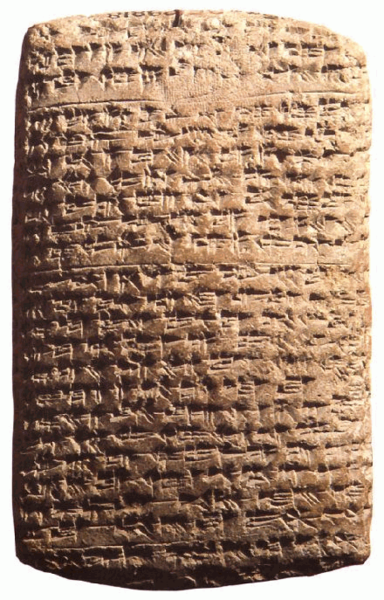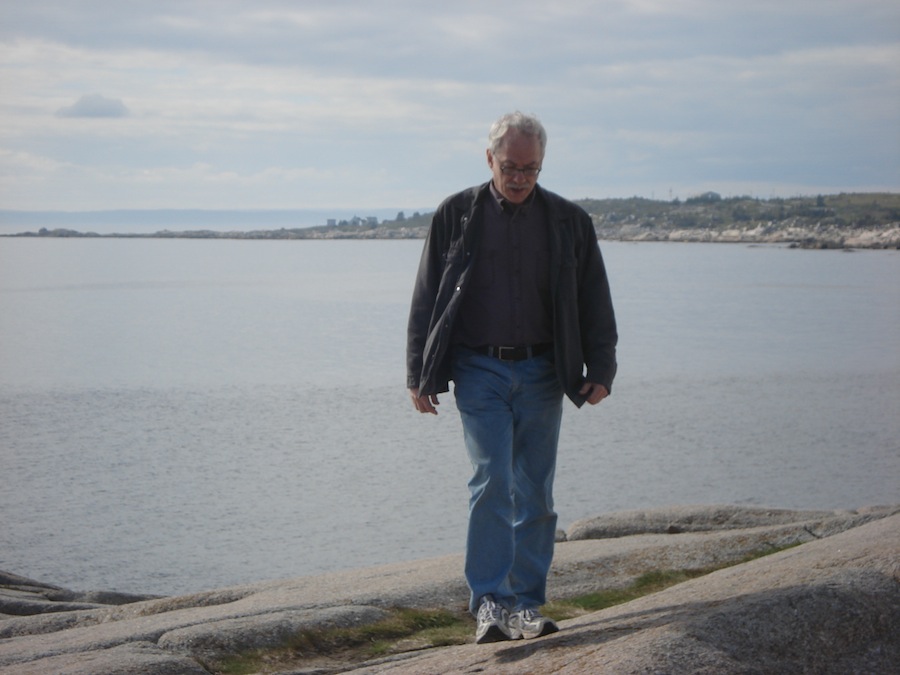
It's Father's Day. Let me tell you a good story about my father. A little background first: You remember cuneiform tablets, right?

a cuneiform tablet, via Wikipedia
The Sumerians used them instead of paper, after they went ahead and invented writing. The obstinate will of baked clay to survive results in a jaw-dropping number of extant cuneiform tablets: not only the Great Literature, but tax records, receipts, shopping lists...
My dad reads those; his name is Maynard Maidman, and he's an Assyriologist. He has spent most of his career reconstructing the social, economic and military history of Nuzi, a long-vanished town situated near the Tigris river in what is now Iraq. Small in itself, Nuzi looms large historically because of its location, in time and space, at the confluence of much larger conflicting forces.
Nuzi and surrounding area, via Wikipedia
In fact, Nuzi is a bit of a problem: its internal history has been reconstructed, but its links to the outside world have always been unclear. Who exactly conquered it? When? When was it finally laid waste?
The answers to these questions carry implications beyond the fate of one small town on the Tigris. They draw in the better-researched chronologies of mighty empires. Some answers rule out the conclusions of some factions of historians; others rule out the conclusions of others.
My dad has been working on this problem. It involves sequences of kings, records of arms and soldiers, the dates of seemingly unrelated events. Did you ever fill out a logic box? They give you an annoyingly incomplete list of clues: Sally sat to the left of somebody wearing a yellow shirt. George and Ralph wore red shirts, etc. You set up a grid, and eliminate the impossibles, and eventually you know where everyone was sitting. Working out the links between Nuzi and its neighbors is like that, except there are hundreds of clues, and no guarantee all the necessary ones are available.
For all that, he's concluded that the entire history of an alleged war between the Babylonians and Assyrians represents a snowballed misreading of a single tablet 50 or 60 years ago. Some of his colleagues find this extremely exciting.
That's not the story I want to tell you. That's just some interesting stuff my dad does.

Maynard Maidman, his awesome girlfriend Janice, and Seurat's 1884-6 masterpiece, A Sunday Afternoon on the Island of La Grande Jatte
I have been interested in many things over time: astronomy, anatomy, music, physics, film, and art. Some interests lasted ages; others not. My dad has supported me in each of them, and the longer I stayed interested, the more he himself became expert in each field. By the time I switched tracks from film to painting, we could discuss grammar and theme in Welles and Kubrick as well as I could with any of my film friends. And the same has occurred with art, his own knowledge and tastes broadening with my experience of it. In this latest field, our conversations are once again as involved as any I have with my peers.
So, finally, here is the story about him I wanted to tell you.
Not long ago, things did not look good for me and my ambitions (this was before the recent almost comedically extreme turn for the better). At that time, the public response was flatlined; it had always been flatlined, and showed no signs of life. I was living hand-to-mouth, spending whatever I had on paint and canvas, piling up gallery rejections and wearing truly pathetic clothes. My college friends, meanwhile, had long since gotten on with acquiring houses, children, and savings, and were making good headway in their careers. I was feeling fairly lowly about things. This is real life -- it is entirely possible to screw it up, and find yourself old, broke, and unknown.
I went to my dad and said, "You know, I'm not doing so great, and here's why." I was feeling the panic of thinking maybe I should start over with something sensible. And he said to me, "Is the work you're doing good?" I said, "I'm doing the best work I can, and I think that apart from that, it's actually good work." And he said, "OK, so, that's the important thing." And I said, "Well, what about all this stuff with career and institutional support and so forth?"
He said, "You have to remember that you have chosen a path which has no standardized means of promotion. On the one hand, it's very exciting, because it's entirely self-driven. But on the other hand, it means that there are no sign-posts because there is no road. You can't measure yourself in comparison with your friends, because they've chosen a marked road, and you've chosen the wilderness. You will spend years thinking you are getting nowhere. In fact, you must. That's part of your job. You may eventually find yourself given startling external rewards for your effort, but whether you do, or don't, is not really important. The only important thing is that you do the best work you can. That's what matters in life, and it's the only thing you can control."
That's what I wanted to share with you about my dad.
Parents can support your life-long process of becoming yourself in any number of ways. When you are little, they can save up, and sign you up for lessons. They can come to your games or your recitals. Later, when you are already off on your own, they can provide moral and financial support. They can become proficient enough in your field to make it possible for you to communicate your passion to them in its own native language.
But this response my dad made to my dilemma -- this is what you could call support through empathy and imagination. He looked at my problem from ground level, as I saw it, so that he could feel its emotional tremors; and he looked at it from above, from the perspective of what he's learned about living. He forged his answer from that double vision. The answer was utterly specific, and totally supportive.
Let's try to return his act of imagination. You are the father of a son. When your son was young, he was just this side of a prodigy in a surprising number of areas. But nothing much ever came of any of his interests. Now, already adult and by no means young enough to be farting around with unrealistic ambitions, your son comes to you, wearing his pathetic clothing. He says, essentially, "I'm worried I'm turning into a loser." It never even occurs to you to say, "Shape up and get a real job." Rather, you describe your son's dilemma to him in a way that shows hope, a way forward -- the hardest way, but none of them is easy. Your answer comes down to, "I have faith in you."
There is reason for this faith, but reason alone doesn't quite justify it. There is a gap. Love fills the gap. It's the costly, nourishing love that will help your son maintain his own faith, go on with the patient, difficult, lifelong work of becoming whatever he can become. Perhaps it is a love that abides in many relationships, but this precise texture of it, a love that expresses itself as an unreasonable but totally practical faith, I have only ever seen from fathers. It's what fathers alone can do.
So -- happy Father's Day to you, Abba, and to all of you fathers who help your children to go on struggling to do their best. Some of us have to do it without you, and many of us can, but how lucky are those of us who do not suffer that profound loneliness.


